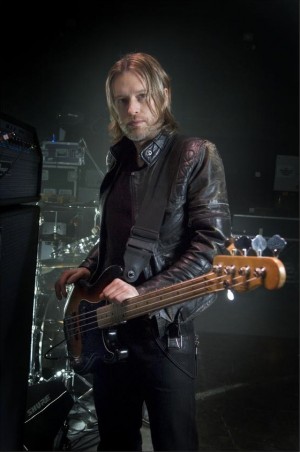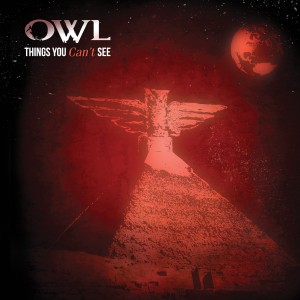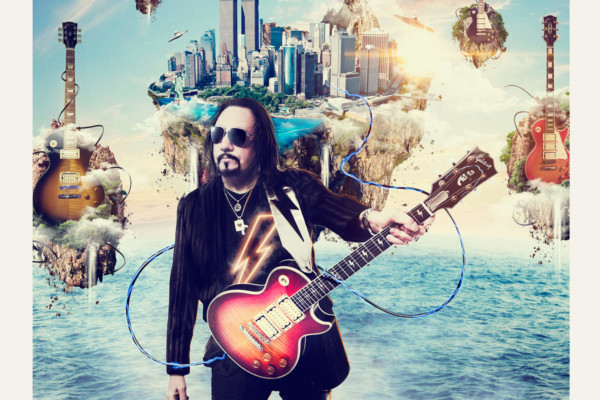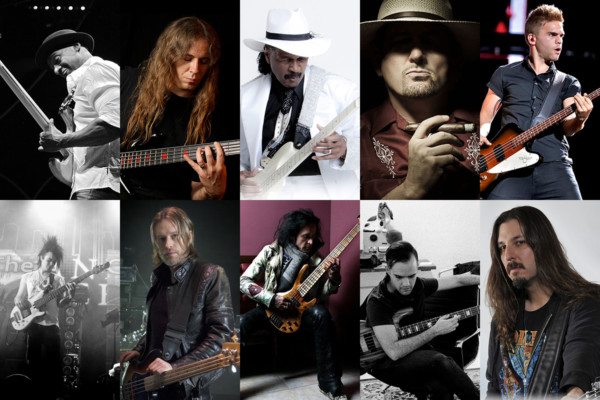Things You Can’t See: An Interview with Chris Wyse
 Bassist Chris Wyse is having a big year. After a decade-long stint with The Cult, he has left their ranks to lay down the low end for the Ace Frehley Band full-time. If that’s not enough, his trio Owl has just released their third album, entitled Things You Can’t See. The six-song collection features Wyse’s thick bass tone and solid lines alongside bandmates Dan Dinsmore and Jason Achilles Mezilis.
Bassist Chris Wyse is having a big year. After a decade-long stint with The Cult, he has left their ranks to lay down the low end for the Ace Frehley Band full-time. If that’s not enough, his trio Owl has just released their third album, entitled Things You Can’t See. The six-song collection features Wyse’s thick bass tone and solid lines alongside bandmates Dan Dinsmore and Jason Achilles Mezilis.
Wyse, who has also worked with Ozzy Osbourne, Mick Jagger, and Tal Bachman, produced the album, as well. “The style we’ve developed is unbridled and unfiltered, as is our message,” he says of the record. “We stand behind every single note front to back.”
We caught up with Wyse to get his background, his advice for up and coming bassists, and the scoop on Things You Can’t See.
How did you get your start on bass?
I started out listening to Kiss and then I was struck by Steve Harris in Iron Maiden. After I heard him I said, “Oh, that’s my instrument!” My first bass was a honey blonde Gibson Gripper. I was really intro shred, and that will always be a part of my background. It’s always going to be a part of me that I’m into intense playing.
How old were you when you moved from New York to Los Angeles?
I grew up as a young kid in Queens and spent time in New York, but I developed in my high school in upstate, where I met Dan Dinsmore. Then I moved to Hollywood. It was a tricky move. It was a big culture shock to a big degree. It’s unexplainable unless you’ve lived in New York and moved to L.A. for the first time, you know? I was lucky because I started out meeting so many wonderful musicians and got playing early. One of my early things was playing with Tal Bachman. The song “She’s So High” was a hit from that record. So that worked out, but I remember the hard times, too, when things were sparse. It wasn’t easy, and I was lucky because more and more gigs kept coming in. I stayed in the fold, but there were times I was wondering how things were going to work out. I had little to no money. I just worked hard at it and got lucky.
Was there a moment when you felt like you made it or is there always that struggle?
I think it’s best to stay as a current artist and be more caught up with what you’re creating. You have to worry about making a living, but I stay vibrant when I just worry about my craft. That always leads to more gigs, so I think that’s the best message I could give people. Just stay out there and stay active.
The industry especially in L.A. has changed so much recently. What advice would you give up and coming bass players?
That’s a good question because it never gets old. Sometimes my interests change, but the craft never does. Even if you’re the biggest rock star bass player on the planet, make sure you can do everything yourself. Make sure you can run your rig and make sure you practice until everything is easy. That really never changes whether you’re a superstar or getting ready for a local show or playing someone’s garage. It’s always the same.
You’ve worked with so many different big name artists. Do you think of yourself as a free agent?
Well, I really get into each thing while I’m doing it like an actor would. Being in The Cult for so many years, I was very involved in some of the direction of those last records and I actually wrote lots of parts. There’s different levels of it, you know what I mean? That was a full decade of being in the band and being identified with that band and working with the band’s music. So really, I was committed to being in that band. I wasn’t really a hired gun because I would [need to be] more open to doing other bands at that point. So for all those years, I stopped with the calls.
[As for] this new decision with Ace Frehley, obviously I’m there to support Ace, but Ace features me and I do a bass solo every night. I sing lead on “Strange Ways”. So really, I’m open to working with other people, but right now I’m very committed to working with Ace and Owl. Owl is a genuine article as well. People are calling it a solo band. I understand they’re saying it’s my band that I’m doing or whatever, but this is our third album that we’ve produced. We’ve been together since 2007. This is my third time producing an Owl record and the material has really come into its own. The bass playing is really edgy and strong. It’s also got a song craft that’s very strong, where you can sing the stuff right back for the most part.
I think of it as a package. I don’t think I’m anyone’s side guy. I think I come in to offer my set of skills. It might be the bow on the upright bass, or it might be my approach to music with the bass guitar. But I always feel I’m there because of what I do even though I can honor their music as well.
I love you bringing in the upright to all these different circumstances you get into. Is that something you try to sneak in or is it asked for?
That’s funny you ask that, because I do at times feel like I can sneak it in. [I do it] because maybe other people aren’t thinking of it. I always have to be willing to take a risk. Some of the stuff will fly and some of it won’t. I like to push the envelope with whoever I’m with. I like to try to be creative.
It definitely adds another layer to the music.
Yeah, I love that. I’m the kind of guy that follows the technology to make sure that things will be loud enough when I play with the upright bass. I work with the acoustic, first of all. My first electric upright was bought for me by Paul D’Amour of Tool, who had a band called Lusk. He was playing guitar in it. He wanted me to play bass in Lusk, but he wanted me to play upright only. I had that Messenger upright, which is awesome. [He got me] a Steinberger NXT upright as well, and I have my own Kay. There were years of trying to find the right kind of pickup and the Barbera transducer system was the loudest and most true. That ended up being on my Messenger upright.
So I’m really deep into the whole craft of it all. Playing with the German bow is maybe my go to; French bow style is my second. I probably go to the German bow much more. And I love playing with effects. I love seeing people jaws drop on the floor at a rock show when they’re like, “Oh my God.” It’s really heavy and it’s fast like a bass guitar can be with effects and everything.
It’s something people don’t associate with upright, but it’s growing.
Yeah, it’s so fun for me. I get to be the lead singer and I get to be a real character and be theatrical with the bow. It just feels great even in a heavy, hard rock format. The Owl arrangements lend themselves to that kind of moodiness, which is the writing style I like. There might be an odd meter or a strange melody, but I’m always trying to get my talons in you, so to speak. [laughs]
You didn’t have the songs for your new album fleshed out when you came into the studio. How did that work out for you?
 It just kind of evolved through planting seeds. I had maybe the general feel of song ideas and we would sort of work on it from there. It was really exciting to hear the songs develop in the studio. I think they came out better than anything we’ve ever done because we pushed farther and we trusted at the same time. It was a great experience.
It just kind of evolved through planting seeds. I had maybe the general feel of song ideas and we would sort of work on it from there. It was really exciting to hear the songs develop in the studio. I think they came out better than anything we’ve ever done because we pushed farther and we trusted at the same time. It was a great experience.
Some of my last stuff happened right up to the end. I was changing a chorus and singing it differently. That was on “Lake Ego”, which has some pretty cool bow work on it. My mom and dad were up in Lake George and Facebook spell checked it as Lake Ego somehow, and I said, “Oh my God, you just gave me the title to the song!” I was writing about egos and struggling in a relationship of sorts and drowning in a lake of ego.
Everything was influencing me [as we went] as opposed to having the song written. Then I’d go in and sing it, and that was up until the end. Everything was done except for the chorus and I kept [messing] around with it. It was great to have such a catchy, heavy lyric go down right at the last second.
I think that style of writing helps the album have an organic feel.
It’s kind of like we’ve got a bit of that Nirvana, garage-y rock band thing but with some orchestration and a weird approach to the bass. Dan’s stomping drums and Jason’s playing is ethereal and spacious. It really works great.
What made you revisit your song “Still Alive” as an acoustic bonus track?
I think it’s just really cool to have that alternate version and show that this band is that diverse where we could literally strip everything down to acoustic songs as well. That was just a take or two and we thought, “Man, that really captures another part of our spectrum.” The five new songs really hit on that new production sound we hit on in the electric realm, but “Still Alive” has a message that’s very cool and very simple. It still has that sound of Owl even though it’s acoustic and stripped down. The bowed stuff is there too, which is cool.


